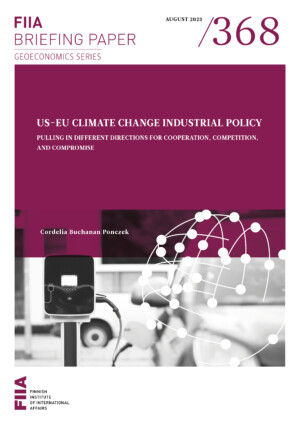The United States and the European Union agree on prioritizing policies to address climate change, which includes securing supply chains for components essential to low-carbon technology. Despite this agreement, their policies to address climate change and low-carbon technology could foster competition.
The US Inflation Reduction Act (IRA) reflects the competitive advantage of the US to draw in the best talents, capabilities, and resources from outside sources. This leads to a disconnect between the industrial policy benefits of the IRA within the US and the potential competitive impact the IRA has on US relationships with allies.
The EU’s policies are shaped by the bloc’s desire to respond to external actors—including China and Russia—while protecting the common market and building up its internal capability to ensure security of supply. This is complicated by individual member-state objectives.
The 2024 US presidential election could bring change: A Republican administration might not share the EU’s outlook on climate change, the need for government intervention, or even the close transatlantic relationship seen during the Biden administration.


